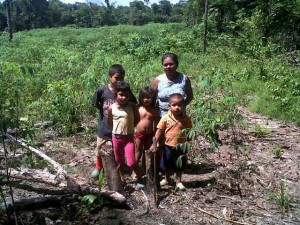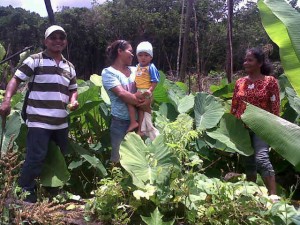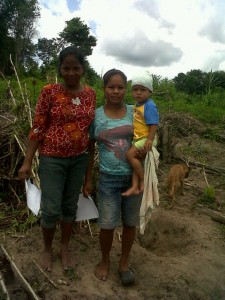By Indrawattie Natram

Women have traditionally lived as subsistence farmers, eking out a meagre living off a few crops, just to maintain their family, with or without male assistance. Today, while many women dominate in offices, some women from the Upper Pomeroon choose to remain in farming – but not to exist in poverty. They have adopted farming because they have seen the satisfying advantages of farming as a business.
Four women from Kabakaburi, a village in the Upper Pomeroon, located 40 miles from Charity on the Essequibo Coast, told Guyana Times Sunday Magazine that farming is beneficial and it helps them to earn.
Three of the hard-working women in the community, Nicola Williams, Judith Lyte and Beverley Lyte, revealed how farming has changed their lives, and how they entered the profession.
Beverley Lyte, a mother, housewife and a farmer, related that cassava cultivation has changed her family’s life. The 33- year- old said that cultivating cassava, a crop traditionally grown in the Kabakaburi area, has made her into someone she is truly proud of.

The mother, who takes care of her home before she ventures into the fields, said that as a small child growing up, her eyes were always on her father, who was a farmer, “I grow up in farming, it’s like a tradition: it pass on,” she mused.
Shedding traditional roles
Beverly noted that before she began her business, she would realize that sometimes, providing all the necessary amenities for the home was difficult with her husband’s earnings alone. She said her home needed many things, and many wants were left unsatisfied. One day she was making cassava pone and realized that cassava as a plant has much potential in local markets.
She said that she spoke later to the two other women, who also faced similar challenges in their homes, and asked them to join her on the farm. She knew about farming, she stated, but she never knew she was so good at it.
Lyte said she met with Nicola Williams and Judith Lyte, and the idea of cultivating 10 acres with cassava emerged. She recalled that they were all excited, and their journey into business began.
Today, the three women are thrilled to be earning profits from their 10 acres of land under cultivation.
A ‘Normal’ Day

Beverly said that also being a housewife makes farming a great challenge. She related that a normal day for the three of them is going to work on the plot of land, located not far from the community. She said after breakfast is prepared for the children and they are sent off to school, the three women go into the fields.
She noted that clearing the lands is most tedious, and requires many laborious hours. In achieving a smooth and level plot of land, the farmer said they would clear and clean the plot with axes and cutlasses. She said that their husbands would sometimes help them when they were not busy, but most of the work is done by the women themselves: the clearing, land preparation, sowing and harvesting.
Harvesting, she disclosed, is difficult for them since their land is located far back of the landing, and the harvesting is done manually then transported to their boats. The distance is a challenge, however it is a challenge endured by the strong women.
After harvesting, they would sell the raw materials to other women in the village who in turn bake cassava bread and sell at the Charity Market.
‘God bless’ opportunity

Lyte, who spoke on behalf of the other women, said that farming has opened many opportunities for them, and described the profession as “God bless”.
She declared that she is earning, and enjoying her life because of farming. She said farming is a great profession where one can see tangible results within weeks, and she remains humbled by the experience.
” It is amazing,” she confessed, “to just put a stick in the earth and next day it blossoms into a fruit then food for persons.”
The farmer advised those who love farming to take it up. She maintained that anyone can become a farmer, however great commitment and dedication is needed.
She said it’s a wonderful profession and can provide good earnings. She said too that she would sometimes even “Google” new farming techniques so as to keep up with technology.
Plans for the future
Due to the profit gains , the three farmers are hoping to extend their lands and plant more cassava. They noted that they are receiving full support from their toshao, and they are thankful.
Apart from bitter cassava cultivation, the women also cultivate eddoes. They said eddo as a cash crop, helps them earn as well, and added that vine crops are sometimes planted between the main crops.
Extra earnings
Another female from the village who finds love in farming is Hazel Daniels, who operates her farm separately. Daniels cultivates two acres of cassava and said that she enjoys farming because she earns extra.
She said that she enjoys the company of her children on the farm at weekends, and it is her fervent wish for them to become farmers also one day.
Crucial Support
Cleveland Simon, toshao of the village, was on the farms with the women while they were harvesting the cassava. Simon said that when he took office in the village, his main aim was to get persons involved in agriculture.
He said today he is very proud of the achievements, and thanked the Ministry of Agriculture for providing proper drainage and irrigation network system in his area. He pointed out that millions of dollars was spent to allow the smooth flow of water to farmlands.
Lands, the toshao also disclosed, are easily available to persons who want to pursue farming.
He also thanked the Ministry of Agriculture for providing staff from the National Agriculture Research Institute to give farmers technical advice, and noted that field officers attached to the ministry are always prompt and offer the necessary advice for the proper growth of the crops. He also said that many youths from the area are attending the Guyana School of Agriculture.
As Guyana observes Agriculture Month, the work of these women in the community highlights the need for others to get involved to help satisfactorily feed themselves, their families and ultimately the nation, and avoid food shortages, prevalent in many other countries today.(Guyana Times Sunday Magazine)



